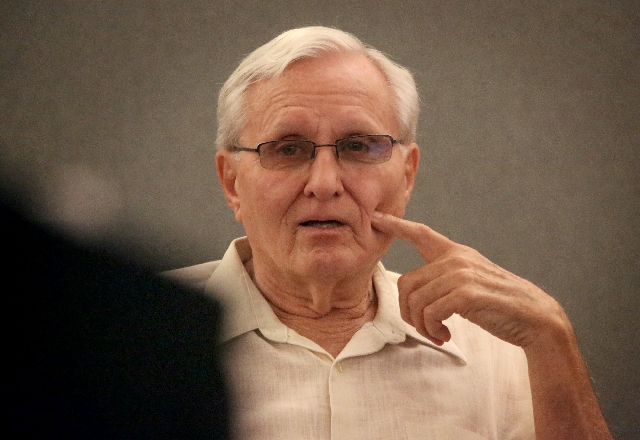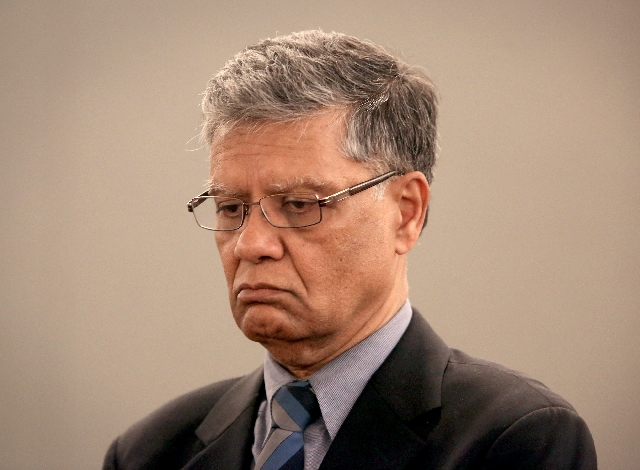Convicted nurse: Desai’s speed ‘compromised’ patients’ care
Convicted nurse anesthetist Keith Mathahs testified Friday that pressure to move patients quickly through Dr. Dipak Desai’s endoscopy clinic “compromised” their care.
“It was very stressful,” Mathahs said on the fifth day of testimony in the hepatitis outbreak trial of Desai and fellow nurse anesthetist Ronald Lakeman. “It was just speed, speed, speed. Come on, let’s go.”
Mathahs, 76, pleaded guilty in December to five criminal charges, including criminal neglect of patients resulting in death, insurance fraud and conspiracy to commit racketeering. He also agreed to cooperate with prosecutors.
In nearly four hours on the witness stand, Mathahs described the working conditions at the Endoscopy Center of Southern Nevada as “horrible” and said staffers felt as though they were walking on “eggshells.”
Desai, whom he called “Dr. D,” bragged about how fast he could do endoscopies and colonoscopies and berated physicians who performed the procedures too slowly.
Desai was so determined to move the procedures along that he would not allow some patients who woke during procedures to receive an additional dose of the anesthetic propofol, Mathahs testified under questioning from Chief Deputy District Attorney Mike Staudaher.
Desai also frequently started procedures before patients were given propofol and would quickly pull scopes out of patients at the end of colonoscopies, causing fecal matter to splash on the medical staff, the walls and the floor, Mathahs said.
Nurses, he said, sometimes were unable to change their fecal-covered gowns as patients rolled nonstop into the procedure rooms.
By the time Mathahs ended his five-year tenure at the endoscopy center in 2008, the number of procedures had doubled to up to 80 a day, he said.
Prosecutors previously told the jury that Desai ran the now-closed clinic like an assembly line at the time of the 2007 hepatitis C outbreak.
Mathahs described Desai on the witness stand as a micro-manager who pinched pennies by being stingy with medical supplies, especially propofol.
It was common practice for staffers under Desai’s orders to reuse single-use bottles of propofol, and disposable syringes, on multiple patients, risking the health of patients, Mathahs testified.
Health officials blamed the hepatitis outbreak on nurse anesthetists reusing propofol vials between patients after the vials had become contaminated by patients with hepatitis C.
Desai often scolded employees for putting too much lubricant on scopes inserted into patients, and he would check waste containers to see whether any materials were being wasted, Mathahs testified.
Mathahs said he always poured out any remaining propofol before throwing vials in the waste containers so Desai couldn’t find any fluid in the vials.
He also admitted to the jury that he unlawfully inflated anesthesia times reported to insurance companies under orders from Desai.
“I don’t know why we did it,” he said. “We were told that’s the way we had to do it.”
Desai, who has sat motionless at the defense table throughout the high-profile trial, did not look at Mathahs during his testimony.
Defense lawyers were to continue cross-examining Mathahs on Monday, as the trial enters its second week of testimony.
Earlier Friday, veteran nurse Jean Scambio testified that she lasted only five months at the endoscopy center in 2006, before the outbreak, because of the working conditions.
“It was very fast, very stressful,” she said. “It just wasn’t a nice atmosphere.”
Scambio said she thought the clinic was “unsafe” with so many patients passing through it.
On Thursday, a hepatitis C researcher testified that he is “absolutely certain” two clusters of the deadly virus detected in 2007 sprang from infected patients who had procedures at the endoscopy center.
Yury Khudyakov, of the Centers for Disease Control and Prevention in Atlanta, provided a scientific explanation for prosecutors of how the two strains of the blood-borne virus match those of the source patients.
Health officials concluded that unsafe injection practices at the clinic led to six patients contracting hepatitis C from a source patient on Sept. 21, 2007.
Another patient was infected the same way from a different source patient on July 25, 2007.
Khudyakov, who tracks outbreaks of hepatitis C around the country, testified that the strains on the two dates are not the same, but the strains of the infected patients and the source patients on each date are nearly identical.
Khudyakov’s testimony is important to the prosecution’s theory that Desai, 63, and Lakeman, 65, were responsible for the seven infections, which have led to the death of one of the victims, Rodolfo Meana.
Desai gave up his Nevada medical license after health officials disclosed the outbreak in 2008.
Desai and Lakeman face a total of 29 criminal charges, including second-degree murder, criminal neglect of patients, theft and insurance fraud. They are being tried in the courtroom of District Judge Valerie Adair.


















